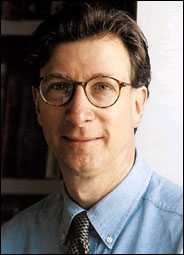Reviews of "Crashing the Borders"
Last week I devoted a couple posts to the advance proof edition of "Crashing the Borders," a new basketball book by New York Times columnist Harvey Araton. Now, I give you a couple articles from the Times itself about the book. The paper lined up two impressive reviewers -- Sports Illustrated writer Alexander Wolff and Terry Pluto, whose books "Big Game, Small World" and "Loose Balls," respectively, are vital additions to any serious basketball library.
A chapter from Wolff's "Big Game" on Philippine basketball inspired me to apply for the Fulbright grant that landed me in Manila. Pluto's oral history of the old ABA is a lot more fun lesson in basketball history than books about the old NBA, which tend to focus ad nauseam on the Celtics' dynasty with Bill Russell and Red Auerbach, who -- to this 23-year-old, at least -- seem like the two most self-righteous know-it-alls in league history. But international basketball -- in some of the remote places Wolff goes to -- and the ABA were both very underreported stories at the time each book was written.
Wolff's review is pretty short. He gives a rundown of Araton's argument about the system-wide failure in American basketball, and that's about it. He agrees with the Araton's notion that versatile, fundamentally-sound foreign players are improving the NBA game, and says they're responsible for faster-paced, higher-scoring games over the last two seasons. That sounds like a reference to Canadian point guard Steve Nash on the run-and-gun Phoenix Suns to me, which is a bit of a red herring since Nash played college ball in California and developed in the American system.
I'm similarly irked when writers, in their overzealous attempts to hype the dominance of foreign players in the NBA, point to Tim Duncan's upbringing in the U.S. Virgin Islands, as if Duncan didn't play four years of college ball in the ACC or as if he didn't compete on Team USA at the Athens Olympics. Young American players like Amare Stoudamire, LeBron James, Dwyane Wade, Carmelo Anthony, Dwight Howard and their ilk are doing as much to restore the NBA's luster as Dirk Nowitzki, Peja Stojakovich and Andrei Kirilenko are.
My favorite part of Wolff's review is his playful ribbing of Araton's fondness for adjectives. "The author rarely permits a noun to leave the locker room unaccessorized with modifiers," says Wolff, referring to Araton-isms like "unspeakable inferno" and "orgasmic marketing inferno." I don't remember feeling like the book was over-written while I was reading it. I just get a kick out of one writer taking polite pot-shots at another.
In his review, Pluto chides Araton for trying to discredit Michael Jordan's winning bucket in Game 6 of the 1998 Finals against the Utah Jazz, where Mike chicken-winged Bryon Russell to the floor before hitting the shot. Like that M.J. pull-up, Pluto's view of the book -- that it's splendid food for thought and that "the fights you can pick with Mr. Araton about his book are reasons to read it" -- is right on target.
|
Let's not forget that Harvey Potter touts his rough-and-tumble upbringing in a Staten Island housing project multiple times in "Crashing the Borders." What's his Wu-Gambino nickname, again? |
A chapter from Wolff's "Big Game" on Philippine basketball inspired me to apply for the Fulbright grant that landed me in Manila. Pluto's oral history of the old ABA is a lot more fun lesson in basketball history than books about the old NBA, which tend to focus ad nauseam on the Celtics' dynasty with Bill Russell and Red Auerbach, who -- to this 23-year-old, at least -- seem like the two most self-righteous know-it-alls in league history. But international basketball -- in some of the remote places Wolff goes to -- and the ABA were both very underreported stories at the time each book was written.
Wolff's review is pretty short. He gives a rundown of Araton's argument about the system-wide failure in American basketball, and that's about it. He agrees with the Araton's notion that versatile, fundamentally-sound foreign players are improving the NBA game, and says they're responsible for faster-paced, higher-scoring games over the last two seasons. That sounds like a reference to Canadian point guard Steve Nash on the run-and-gun Phoenix Suns to me, which is a bit of a red herring since Nash played college ball in California and developed in the American system.
I'm similarly irked when writers, in their overzealous attempts to hype the dominance of foreign players in the NBA, point to Tim Duncan's upbringing in the U.S. Virgin Islands, as if Duncan didn't play four years of college ball in the ACC or as if he didn't compete on Team USA at the Athens Olympics. Young American players like Amare Stoudamire, LeBron James, Dwyane Wade, Carmelo Anthony, Dwight Howard and their ilk are doing as much to restore the NBA's luster as Dirk Nowitzki, Peja Stojakovich and Andrei Kirilenko are.
My favorite part of Wolff's review is his playful ribbing of Araton's fondness for adjectives. "The author rarely permits a noun to leave the locker room unaccessorized with modifiers," says Wolff, referring to Araton-isms like "unspeakable inferno" and "orgasmic marketing inferno." I don't remember feeling like the book was over-written while I was reading it. I just get a kick out of one writer taking polite pot-shots at another.
In his review, Pluto chides Araton for trying to discredit Michael Jordan's winning bucket in Game 6 of the 1998 Finals against the Utah Jazz, where Mike chicken-winged Bryon Russell to the floor before hitting the shot. Like that M.J. pull-up, Pluto's view of the book -- that it's splendid food for thought and that "the fights you can pick with Mr. Araton about his book are reasons to read it" -- is right on target.



1 Comments:
Hey, it looks like your review & discussion of Araton's book from a couple weeks ago was right on the money. And from Manila, too! Keep up the roundball discussions, it's fascinating stuff. I've been telling my friends to check you out, though it doesn't look like they write anything. Too timid.
Keep on truckin, Fulbright Man.
Post a Comment
<< Home